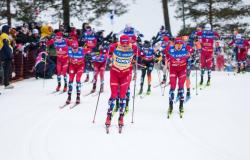Arina Aamir (Right) is 18 years old and the youngest city council representative in Oslo.
She grew up on Høybråten in Stovner. It is the Oslo district where the proportion of children living in families with persistently low incomes is the highest.
In this interview, she talks about some of the taboos in the debate surrounding Oslo football:
- Parents.
- The spirit of hard work.
- It social controlHow society regulates how people should behave. Social control can take place informally, by family and friends, or formally by the police, judiciary and other authorities. of the girls.
In the article series “The divided football city”, VG goes in depth on the differences in Football-Oslo.
Is it the parents’ wallet and postcode that determine who can be good at football in Norway?
Cultural differences can also play a role, without it being talked about out loud. Low-income areas in Oslo have a higher proportion of people with an immigrant background.
– I myself grew up on the eastern edge, and I see how big the difference is between those who play sports and those who don’t, says Arina Aamir.
– And then there are many reasons why people do not play sports here. It can be anything from bad advice to social control.
– Or laziness – to speak for myself, she smiles.
Arina Aamir meets VG in the spring sun on Ellingsrud artificial grass, which is rural to the north-east of the capital, right on the border with Lørenskog.
– What is important to me is that everyone should have the opportunity to play sports, if they want to.
– But today it is a reality that one side of the city does not have the real opportunity to choose sports, due to many different things, she says.

VG’s count shows that right now more national team players are coming from the west than the east.
Oslo football circle says that children in low-income areas generally get a poorer offer – even though pitch access is described as challenging for the vast majority.
Aftenposten focused on the topic last year. The newspaper showed that the western teams dominated youth football.
– I remember that early in primary school, all the boys wanted to be football stars. You had those who only played during recess, and those who played sports after school.
– To this day, I see them going to football training in the local area. Those who only played during the free minutes, I don’t quite know how it goes. But I know that a couple of them have gone down the criminal path.
She is convinced that good sports facilities prevent crime.
– The children who have a plan with several training sessions a week are much more difficult to recruit into the criminal gangs.
Sport and crime
Does sport prevent crime?– We have good examples of this in both Norwegian and Swedish sports, says Line Hurrød, advisor to the Norwegian Sports Confederation.
Last autumn, Norwegian sports went on a study trip to Malmö to learn more about how sport is used there as a tool to reduce youth crime.
– That young people get involved in a meaningful and fun leisure activity where they feel seen and feel a sense of belonging is very important to avoid young people being recruited into criminal environments, says Line Hurrød.
– One important step is to make our sports teams robust with solid finances and skilled managers and coaches so that we get good sports offers over time. Financial support schemes from the public sector must be predictable and to a lesser extent project-based, says Hurrød.
– Sport, the school, the municipality and other voluntary organizations must work together to recruit and retain young people in sport. Not least, we need more facilities that can accommodate varied activities so that everyone can find an activity they like in their local environment, says Hurrød.
– There are more people reporting to us about a greater willingness to help in the west – and that parents don’t turn up for matches in the east?
– I think sports can be an important integration arena for parents. Here in Norway, there is an idea that the whole family should be involved. So when there are matches, the parents must join and line up.
– With a child in sports, you not only integrate that child, but you provide opportunities for the whole family.

The right-wing politician believes that the sports teams must have an offensive attitude about this – and to a greater extent actively recruit children and parents.
– But there is also the barrier that you don’t want girls to play sports. They must do well at school, get good grades and contribute at home. It is a big challenge, and then you have to work structurally.
– Because we know that social control is still a big problem here in Norway.
She points out that the Conservative Party wants a needs-tested leisure card that gives all children the opportunity to participate in at least one organized leisure activity a week – without that solving “everything”.
– One thing that will be brought out is that some parents do not have the opportunity to come anyway. There are several who work double shifts. One of the most important things we can do is to make sport harmless. We do that by getting the boys into sports first.









